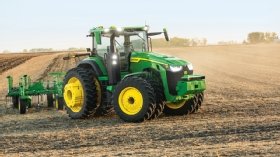precision agriculture
What is precision agriculture?
Precision agriculture (PA) is a farming management concept based on observing, measuring and responding to inter- and intra-field variability in crops. PA is also sometimes referred to as precision farming, satellite agriculture, as-needed farming and site-specific crop management (SSCM).
Precision agriculture uses information technology (IT) to ensure that crops and soil receive exactly what they need for optimum health and productivity. This also ensures profitability,
sustainability and protection of the environment. It considers aspects such as soil type, terrain, weather, plant growth and yield data when managing crops.

How does precision agriculture work?
To do its job, precision agriculture relies upon specialized equipment, software and IT services. This includes accessing real-time data about the conditions of the crops, soil and ambient air, along with other relevant information such as hyperlocal weather predictions, labor costs and equipment availability.
The real-time data is collected via sensors in fields that measure the moisture content and temperature of the soil and surrounding air. Satellites and robotic drones can also provide farmers with real-time images of individual plants.
What are the benefits of precision agriculture?
After data is collected, predictive analytics software uses the collected data to provide farmers with guidance about crop rotation, optimal planting times, harvesting times and soil management.
Agricultural control centers can integrate sensor data and imaging input with other data to provide farmers with the ability to identify fields that require treatment and determine the optimum amount of water, fertilizers and pesticides to apply.
This helps the farmer avoid wasting resources and prevent run-off, ensuring that the soil has just the right number of additives for optimum health while also reducing costs and controlling the farm's environmental impact.
What are the use cases for precision agriculture?
In the past, precision agriculture was limited to larger operations that could support the IT infrastructure and other technology resources required to fully implement and benefit from the benefits of precision agriculture.
Today, however, mobile apps, smart sensors, drones and cloud computing make precision agriculture possible for farming cooperatives and even small family farms.
Some of the most popular applications for precision agriculture today include:
- Agricultural mapping and field scouting. Drones equipped with cameras can create high-resolution maps of fields. This data can identify problem areas, track crops and assess yield potential.
- Soil sampling and analysis. Mobile apps can collect data about soil type, fertility, moisture content, and more. This information can decide about irrigation, fertilization and other aspects of crop management.
- Weather monitoring. Hyperlocal weather data can help users decide when to plant, how much water to give crops and when to harvest.
- Labor management. GPS-enabled mobile apps can track the location and activity of workers in the field. This data can optimize workflows and ensure that tasks are completed efficiently.
- Equipment management. Agricultural equipment is expensive, and precision agriculture can help farmers keep track of their equipment, schedule maintenance and plan for repairs.
Are there any challenges involved with precision agriculture?
Precision agriculture is not without its challenges. One of the biggest challenges is data management. The sheer volume of data collected by precision agriculture sensors can be overwhelming, and it's difficult to make sense of it all.
Another challenge is integrating all the different data sources. There are a lot of different data sets involved in precision agriculture, and it's difficult to get them all to work together.
Finally, precision agriculture requires a significant investment in technology. The equipment and software required for precision agriculture can be expensive, and it takes time to learn how to use it all effectively.
Despite these challenges, precision agriculture is becoming more and more popular as farmers strive to optimize efficiency and returns on their crops.
Learn about the challenges of building a smart agriculture system and explore the advantages of a smart irrigation system.